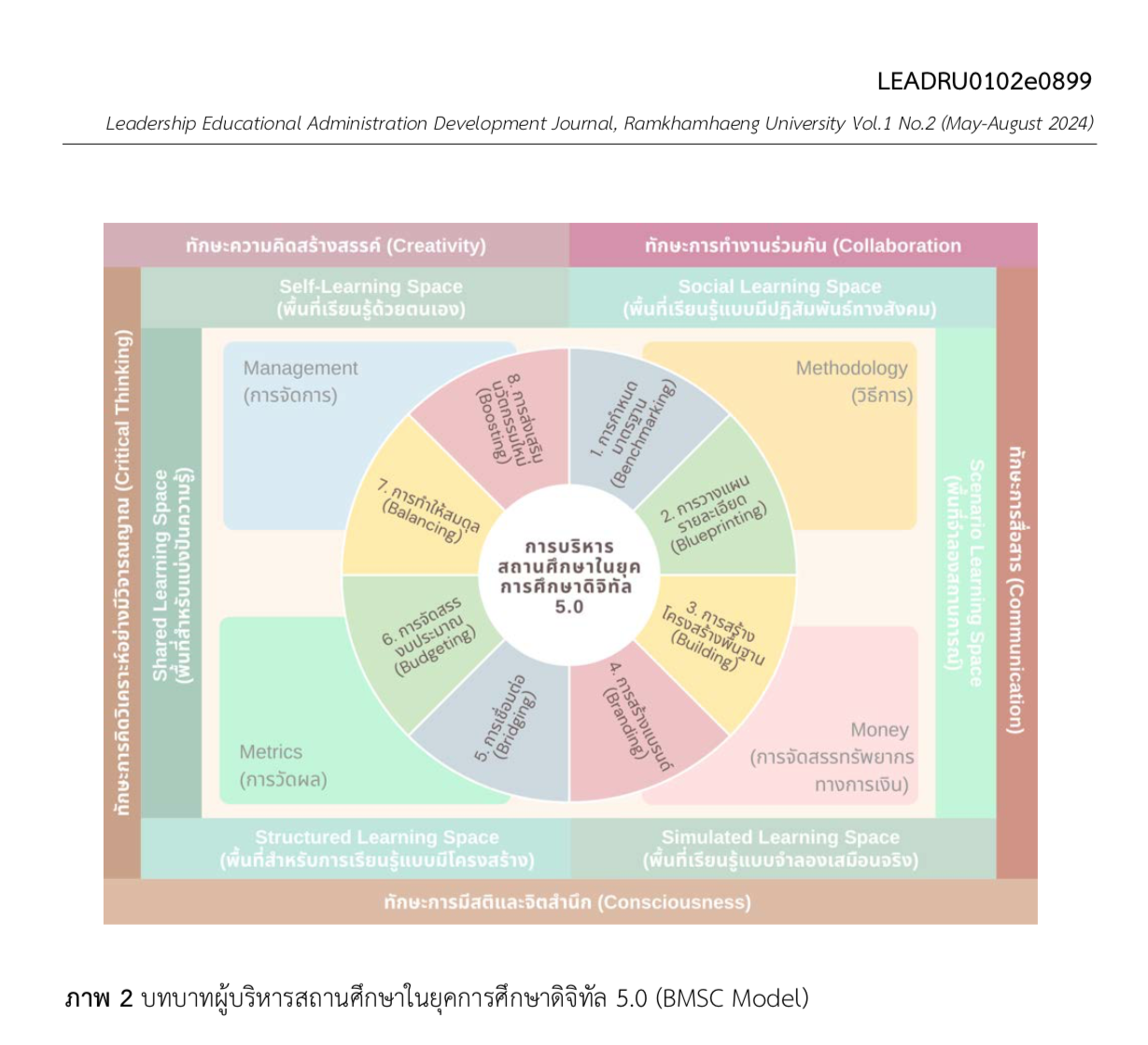การบริหารสถานศึกษาในยุคการศึกษาดิจิทัล 5.0
Main Article Content
บทคัดย่อ
บทความนี้ มีวัตถุประสงค์เพื่อศึกษาองค์ความรู้เกี่ยวกับการศึกษาดิจิทัล 5.0 อันนำมาซึ่งความท้าทายและโอกาสใหม่ ๆ สำหรับการบริหารสถานศึกษา โดยการบูรณาการเทคโนโลยีเข้ากับการจัดการโรงเรียนอย่างมีประสิทธิภาพ และนำเสนอรูปแบบการบริหารสถานศึกษา 5.0 BMSC ในยุคนี้ซึ่งประกอบด้วย กระบวนการสำคัญหลายประการ ได้แก่ การกำหนดมาตรฐาน การวางแผนรายละเอียด การสร้างโครงสร้างพื้นฐาน การสร้างแบรนด์ การเชื่อมต่อ การจัดสรรงบประมาณ การทำให้สมดุล และการส่งเสริมนวัตกรรมใหม่ นอกจากนี้ยังเสนอกรอบกลยุทธ์ 4M (Management, Methodology, Metrics, Money) สำหรับการบูรณาการเครื่องมือและวิธีการดิจิทัลในสถาบันการศึกษา รวมถึงการสร้างพื้นที่เรียนรู้ที่เน้นการเสริมสร้างประสบการณ์การเรียนรู้ที่หลากหลาย และสมรรถนะผู้บริหารตามกรอบแนวคิด PENTA-CORE 5C (Critical Thinking, Creativity, Collaboration, Communication, Consciousness) ซึ่งจะช่วยเสริมสร้างความสามารถในการนำพาสถานศึกษาให้เติบโตและประสบความสำเร็จในยุคดิจิทัลอย่างมั่นคงและยั่งยืน
Downloads
Article Details

อนุญาตภายใต้เงื่อนไข Creative Commons Attribution-NonCommercial-NoDerivatives 4.0 International License.
The authors are solely accountable for the ideas and recommendations articulated in the articles published in The LEAD Journal RU. Should there be any inaccuracies, the authors accept full responsibility for such errors.
Moreover, the Editorial Board, Editorial Team, and Committee of The LEAD Journal RU are committed to maintaining the integrity of the principles reflected in the authors' contributions.
Consequently, Ramkhamhaeng University, the Editorial Board, Editorial Team, and Editors shall not be held liable for any outcomes arising from the authors' presentation of their ideas and recommendations within The LEAD Journal RU.
เอกสารอ้างอิง
Digital Government Development Agency. (2019). Manual for Managing Information Systems In Educational Institutions. Retrieved from
https://www.dga.or.th/document-sharing/manual-service/47126/. [In Thai].
Digital Technology for Education Center. (2020). Digital Education Situation Report 2020. Retrieved from https://shorturl.asia/bgpnK. [In Thai].
Inkaewkrua, K. (2021). Skills and Leadership of Educational Administrators in the Digital Era.
National and International Research Presentation Conference, 14, 989. [In Thai].
Intharawiset, I., Phuiketnakorn, T., Charoensa, T., Nak-In, N., Agbi, A. and Reaung-Rong, P. (2019). Technology and Innovation for Instructional in Digital Era. Humanities, Social Sciences and Arts, Veridian E-Journal, Silpakorn University, 12(6), 478-494. [In Thai].
Ministry of Education. (2024). Announcement from the Ministry of Education: Policy on the Management of Education by the Ministry of Education for Fiscal Years 2021-2022. Retrieved from https://drive.google.com/file/d/11a97xUrrRums5QAp7k- 23HTCgiCQXXnB/view. [In Thai].
Ministry of Education. (2024). Core Curriculum of Basic Education B.E. 2551 (2008). Retrieved from http://academic.obec.go.th/images/document/1525235513_d_1.pdf. [In Thai].
Office of the Education Council. (2017). National Education Plan B.E. 2560-2579 (2017-2036). Retrieved from https://shorturl.asia/hN9I7. [In Thai].
Office of the Education Council. (2020). Guidelines for Developing Digital Education Platform For National Digital Education. Bangkok: Prikwan Graphic. [In Thai].
Panich, W. (2012). The Way of Learning for Students in the 21st Century. Bangkok: Sodsri- Saridwongsa Foundation. [In Thai].
Pechsang, P. (2020). The Role of School Administrators in Managing Information Technology For Education. Journal of Education Naresuan University, 22(1), 214-229. [In Thai].
Prayoonrat, P. (2021). Guidelines for Digital Education Management. Bangkok: Chulalongkorn University Press. [In Thai].
Soraphan, C. (2021). The Role of Educational Administrators in the Digital Age. Retrieved from https://shorturl.asia/Xy1GY. [In Thai].
Theerapattanawong, T. (2018). Digital Technology Strategies for Public Administration. (Doctoral Thesis, Valaya Alongkorn Rajabhat University). [In Thai].
Wasi, P. (2015). Education and Sustainable Development. Bangkok: S. Thammaphon. [In Thai]. WICE Logistics. (2017). Digital 4.0. Retrieved from https://www.wice.co.th/2018/01/11/digital-4-0-technology/. [In Thai].
Wongkijrungreung, W. (2017). ICT for New Age Education. Bangkok: SE-EDUCATION. [In Thai].


